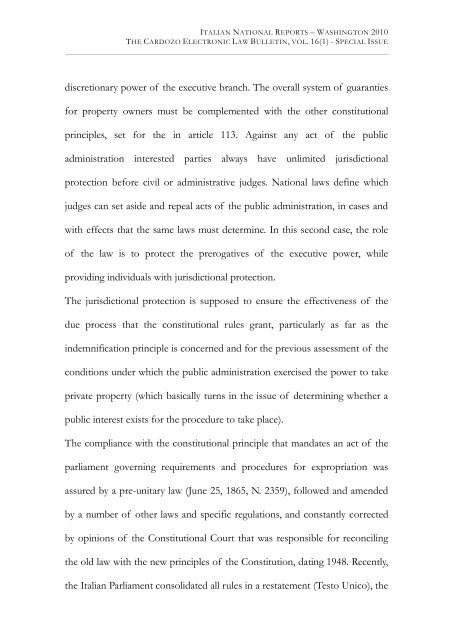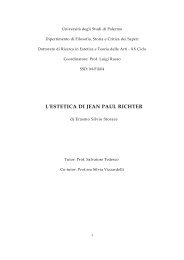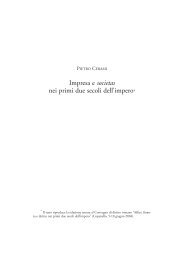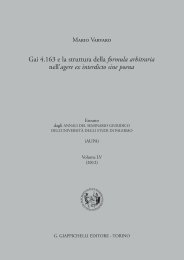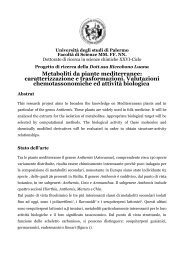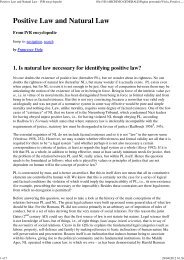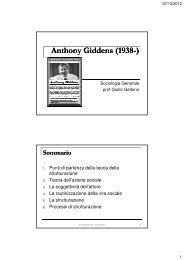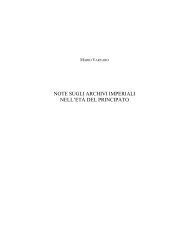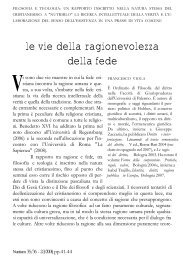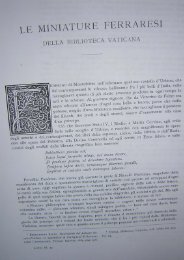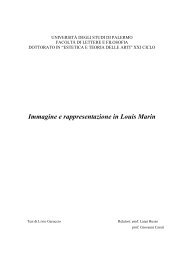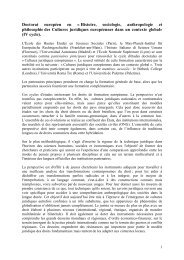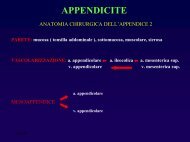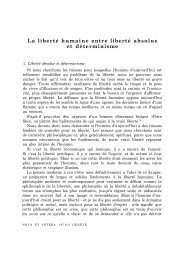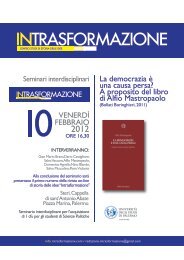- Page 1 and 2:
___________________________ ITALIAN
- Page 3 and 4:
ITALIAN NATIONAL REPORTS TO 18TH WO
- Page 5 and 6:
RELIGION AND THE SECULAR STATE: THE
- Page 7 and 8:
Alessandro Ferrari, Silvio Ferrari
- Page 9 and 10:
Alessandro Ferrari, Silvio Ferrari
- Page 11 and 12:
Alessandro Ferrari, Silvio Ferrari
- Page 13 and 14:
Alessandro Ferrari, Silvio Ferrari
- Page 15 and 16:
Alessandro Ferrari, Silvio Ferrari
- Page 17 and 18:
Alessandro Ferrari, Silvio Ferrari
- Page 19 and 20:
Alessandro Ferrari, Silvio Ferrari
- Page 21 and 22:
Alessandro Ferrari, Silvio Ferrari
- Page 23 and 24:
Alessandro Ferrari, Silvio Ferrari
- Page 25 and 26:
Alessandro Ferrari, Silvio Ferrari
- Page 27 and 28:
Alessandro Ferrari, Silvio Ferrari
- Page 29 and 30:
Alessandro Ferrari, Silvio Ferrari
- Page 31 and 32:
Alessandro Ferrari, Silvio Ferrari
- Page 33 and 34:
Alessandro Ferrari, Silvio Ferrari
- Page 35 and 36:
Alessandro Ferrari, Silvio Ferrari
- Page 37 and 38:
Alessandro Ferrari, Silvio Ferrari
- Page 39 and 40:
ITALIAN NATIONAL REPORTS - WASHINGT
- Page 41 and 42:
ITALIAN NATIONAL REPORTS - WASHINGT
- Page 43 and 44:
ITALIAN NATIONAL REPORTS - WASHINGT
- Page 45 and 46:
ITALIAN NATIONAL REPORTS - WASHINGT
- Page 47 and 48:
ITALIAN NATIONAL REPORTS - WASHINGT
- Page 49 and 50:
ITALIAN NATIONAL REPORTS - WASHINGT
- Page 51 and 52:
ITALIAN NATIONAL REPORTS - WASHINGT
- Page 53 and 54:
ITALIAN NATIONAL REPORTS - WASHINGT
- Page 55 and 56:
ITALIAN NATIONAL REPORTS - WASHINGT
- Page 57 and 58:
ITALIAN NATIONAL REPORTS - WASHINGT
- Page 59 and 60:
ITALIAN NATIONAL REPORTS - WASHINGT
- Page 61 and 62:
ITALIAN NATIONAL REPORTS - WASHINGT
- Page 63 and 64:
ITALIAN NATIONAL REPORTS - WASHINGT
- Page 65 and 66:
ITALIAN NATIONAL REPORTS - WASHINGT
- Page 67 and 68:
ITALIAN NATIONAL REPORTS - WASHINGT
- Page 69 and 70:
ITALIAN NATIONAL REPORTS - WASHINGT
- Page 71 and 72:
ITALIAN NATIONAL REPORTS - WASHINGT
- Page 73 and 74:
ITALIAN NATIONAL REPORTS - WASHINGT
- Page 75 and 76:
International Academy of Comparativ
- Page 77 and 78:
as a matter of fact, the provision
- Page 79 and 80:
This unorthodox use of the escape c
- Page 81 and 82:
In the area of contracts, notwithst
- Page 83 and 84:
unity and universality of successio
- Page 85 and 86:
who died domiciled in Switzerland i
- Page 87 and 88:
2. Lois de police The PILA also rec
- Page 89 and 90:
mentioned above, Swiss courts canno
- Page 91 and 92:
According to the residual rule of A
- Page 93 and 94:
mercatoria, or to international con
- Page 95 and 96:
• For contracts on the sale of go
- Page 97 and 98:
CLASS ACTIONS / LES ACTIONS COLLECT
- Page 99 and 100:
Diego Corapi (General Editor) Class
- Page 101 and 102:
Diego Corapi (General Editor) Class
- Page 103 and 104:
Diego Corapi (General Editor) Class
- Page 105 and 106:
Diego Corapi (General Editor) Class
- Page 107 and 108:
CLASS ACTIONS / LES ACTIONS COLLECT
- Page 109 and 110:
Andrea Zoppini Class Actions / Les
- Page 111 and 112:
Andrea Zoppini Class Actions / Les
- Page 113 and 114:
Andrea Zoppini Class Actions / Les
- Page 115 and 116:
Andrea Zoppini Class Actions / Les
- Page 117 and 118:
Andrea Zoppini Class Actions / Les
- Page 119 and 120:
ITALIAN NATIONAL REPORTS - WASHINGT
- Page 121 and 122:
ITALIAN NATIONAL REPORTS - WASHINGT
- Page 123 and 124:
ITALIAN NATIONAL REPORTS - WASHINGT
- Page 125 and 126:
ITALIAN NATIONAL REPORTS - WASHINGT
- Page 127 and 128:
ITALIAN NATIONAL REPORTS - WASHINGT
- Page 129 and 130:
ITALIAN NATIONAL REPORTS - WASHINGT
- Page 131 and 132:
ITALIAN NATIONAL REPORTS - WASHINGT
- Page 133 and 134:
ITALIAN NATIONAL REPORTS - WASHINGT
- Page 135 and 136:
ITALIAN NATIONAL REPORTS - WASHINGT
- Page 137 and 138:
ITALIAN NATIONAL REPORTS - WASHINGT
- Page 139 and 140:
ITALIAN NATIONAL REPORTS - WASHINGT
- Page 141 and 142:
ITALIAN NATIONAL REPORTS - WASHINGT
- Page 143 and 144:
ITALIAN NATIONAL REPORTS - WASHINGT
- Page 145 and 146:
ITALIAN NATIONAL REPORTS - WASHINGT
- Page 147 and 148:
ITALIAN NATIONAL REPORTS - WASHINGT
- Page 149 and 150:
ITALIAN NATIONAL REPORTS - WASHINGT
- Page 151 and 152:
ITALIAN NATIONAL REPORTS - WASHINGT
- Page 153 and 154:
ITALIAN NATIONAL REPORTS - WASHINGT
- Page 155 and 156:
ITALIAN NATIONAL REPORTS - WASHINGT
- Page 157 and 158:
ITALIAN NATIONAL REPORTS - WASHINGT
- Page 159 and 160:
ITALIAN NATIONAL REPORTS - WASHINGT
- Page 161 and 162:
HEDGE FUNDS, PRIVATE EQUITY FUNDS A
- Page 163 and 164:
Raffaele Lener Hedge Funds, Private
- Page 165 and 166:
Raffaele Lener Hedge Funds, Private
- Page 167 and 168:
Raffaele Lener Hedge Funds, Private
- Page 169 and 170:
Raffaele Lener Hedge Funds, Private
- Page 171 and 172:
Raffaele Lener Hedge Funds, Private
- Page 173 and 174:
Raffaele Lener Hedge Funds, Private
- Page 175 and 176:
Raffaele Lener Hedge Funds, Private
- Page 177 and 178:
Raffaele Lener Hedge Funds, Private
- Page 179 and 180:
Raffaele Lener Hedge Funds, Private
- Page 181 and 182:
Raffaele Lener Hedge Funds, Private
- Page 183 and 184:
Raffaele Lener Hedge Funds, Private
- Page 185 and 186:
QUESTIONNAIRE I. ECONOMIC ASPECTS I
- Page 187 and 188:
ITALIAN NATIONAL REPORTS - WASHINGT
- Page 189 and 190:
ITALIAN NATIONAL REPORTS - WASHINGT
- Page 191 and 192:
ITALIAN NATIONAL REPORTS - WASHINGT
- Page 193 and 194:
ITALIAN NATIONAL REPORTS - WASHINGT
- Page 195 and 196:
ITALIAN NATIONAL REPORTS - WASHINGT
- Page 197 and 198:
ITALIAN NATIONAL REPORTS - WASHINGT
- Page 199 and 200:
ITALIAN NATIONAL REPORTS - WASHINGT
- Page 201 and 202:
ITALIAN NATIONAL REPORTS - WASHINGT
- Page 203 and 204:
ITALIAN NATIONAL REPORTS - WASHINGT
- Page 205 and 206:
ITALIAN NATIONAL REPORTS - WASHINGT
- Page 207 and 208:
ITALIAN NATIONAL REPORTS - WASHINGT
- Page 209 and 210:
ITALIAN NATIONAL REPORTS - WASHINGT
- Page 211 and 212:
ITALIAN NATIONAL REPORTS - WASHINGT
- Page 213 and 214:
ITALIAN NATIONAL REPORTS - WASHINGT
- Page 215 and 216:
VI. SUBSTANTIVE ASPECTS. ITALIAN NA
- Page 217 and 218:
ITALIAN NATIONAL REPORTS - WASHINGT
- Page 219 and 220:
ITALIAN NATIONAL REPORTS - WASHINGT
- Page 221 and 222:
ITALIAN NATIONAL REPORTS - WASHINGT
- Page 223 and 224:
Unfair Commercial Practices ITALIAN
- Page 225 and 226:
ITALIAN NATIONAL REPORTS - WASHINGT
- Page 227 and 228:
ITALIAN NATIONAL REPORTS - WASHINGT
- Page 229 and 230:
ITALIAN NATIONAL REPORTS - WASHINGT
- Page 231 and 232:
ITALIAN NATIONAL REPORTS - WASHINGT
- Page 233 and 234:
ITALIAN NATIONAL REPORTS - WASHINGT
- Page 235 and 236:
ITALIAN NATIONAL REPORTS - WASHINGT
- Page 237 and 238:
ITALIAN NATIONAL REPORTS - WASHINGT
- Page 239 and 240:
ITALIAN NATIONAL REPORTS - WASHINGT
- Page 241 and 242:
2 c) to e) ITALIAN NATIONAL REPORTS
- Page 243 and 244:
ITALIAN NATIONAL REPORTS - WASHINGT
- Page 245 and 246:
ITALIAN NATIONAL REPORTS - WASHINGT
- Page 247 and 248:
ITALIAN NATIONAL REPORTS - WASHINGT
- Page 249 and 250:
ITALIAN NATIONAL REPORTS - WASHINGT
- Page 251 and 252:
ITALIAN NATIONAL REPORTS - WASHINGT
- Page 253 and 254:
ITALIAN NATIONAL REPORTS - WASHINGT
- Page 255 and 256:
ITALIAN NATIONAL REPORTS - WASHINGT
- Page 257 and 258:
ITALIAN NATIONAL REPORTS - WASHINGT
- Page 259 and 260:
ITALIAN NATIONAL REPORTS - WASHINGT
- Page 261 and 262:
ITALIAN NATIONAL REPORTS - WASHINGT
- Page 263 and 264:
ITALIAN NATIONAL REPORTS - WASHINGT
- Page 265 and 266:
ITALIAN NATIONAL REPORTS - WASHINGT
- Page 267 and 268:
ITALIAN NATIONAL REPORTS - WASHINGT
- Page 269 and 270:
ITALIAN NATIONAL REPORTS - WASHINGT
- Page 271 and 272:
ITALIAN NATIONAL REPORTS - WASHINGT
- Page 273 and 274:
ITALIAN NATIONAL REPORTS - WASHINGT
- Page 275 and 276:
ITALIAN NATIONAL REPORTS - WASHINGT
- Page 277 and 278:
ITALIAN NATIONAL REPORTS - WASHINGT
- Page 279 and 280:
ITALIAN NATIONAL REPORTS - WASHINGT
- Page 281 and 282:
ITALIAN NATIONAL REPORTS - WASHINGT
- Page 283 and 284:
ITALIAN NATIONAL REPORTS - WASHINGT
- Page 285 and 286:
ITALIAN NATIONAL REPORTS - WASHINGT
- Page 287 and 288:
ITALIAN NATIONAL REPORTS - WASHINGT
- Page 289 and 290:
ITALIAN NATIONAL REPORTS - WASHINGT
- Page 291 and 292:
I.B.2.C Exclusive Jurisdiction ITAL
- Page 293 and 294:
ITALIAN NATIONAL REPORTS - WASHINGT
- Page 295 and 296:
ITALIAN NATIONAL REPORTS - WASHINGT
- Page 297 and 298:
ITALIAN NATIONAL REPORTS - WASHINGT
- Page 299 and 300:
ITALIAN NATIONAL REPORTS - WASHINGT
- Page 301 and 302:
ITALIAN NATIONAL REPORTS - WASHINGT
- Page 303 and 304:
ITALIAN NATIONAL REPORTS - WASHINGT
- Page 305 and 306:
ITALIAN NATIONAL REPORTS - WASHINGT
- Page 307 and 308:
ITALIAN NATIONAL REPORTS - WASHINGT
- Page 309 and 310:
ITALIAN NATIONAL REPORTS - WASHINGT
- Page 311 and 312:
ITALIAN NATIONAL REPORTS - WASHINGT
- Page 313 and 314:
ITALIAN NATIONAL REPORTS - WASHINGT
- Page 315 and 316:
ITALIAN NATIONAL REPORTS - WASHINGT
- Page 317 and 318:
ITALIAN NATIONAL REPORTS - WASHINGT
- Page 319 and 320:
ITALIAN NATIONAL REPORTS - WASHINGT
- Page 321 and 322:
ITALIAN NATIONAL REPORTS - WASHINGT
- Page 323 and 324:
ITALIAN NATIONAL REPORTS - WASHINGT
- Page 325 and 326:
ITALIAN NATIONAL REPORTS - WASHINGT
- Page 327 and 328:
ITALIAN NATIONAL REPORTS - WASHINGT
- Page 329 and 330:
ITALIAN NATIONAL REPORTS - WASHINGT
- Page 331 and 332:
ITALIAN NATIONAL REPORTS - WASHINGT
- Page 333 and 334:
ITALIAN NATIONAL REPORTS - WASHINGT
- Page 335 and 336:
ITALIAN NATIONAL REPORTS - WASHINGT
- Page 337 and 338:
ITALIAN NATIONAL REPORTS - WASHINGT
- Page 339 and 340:
ITALIAN NATIONAL REPORTS - WASHINGT
- Page 341 and 342:
ITALIAN NATIONAL REPORTS - WASHINGT
- Page 343 and 344:
ITALIAN NATIONAL REPORTS - WASHINGT
- Page 345 and 346:
ITALIAN NATIONAL REPORTS - WASHINGT
- Page 347 and 348:
ITALIAN NATIONAL REPORTS - WASHINGT
- Page 349 and 350:
ITALIAN NATIONAL REPORTS - WASHINGT
- Page 351 and 352:
ITALIAN NATIONAL REPORTS - WASHINGT
- Page 353 and 354:
ITALIAN NATIONAL REPORTS - WASHINGT
- Page 355 and 356:
ITALIAN NATIONAL REPORTS - WASHINGT
- Page 357 and 358:
ITALIAN NATIONAL REPORTS - WASHINGT
- Page 359 and 360:
ITALIAN NATIONAL REPORTS - WASHINGT
- Page 361 and 362:
ITALIAN NATIONAL REPORTS - WASHINGT
- Page 363 and 364:
ITALIAN NATIONAL REPORTS - WASHINGT
- Page 365 and 366: ITALIAN NATIONAL REPORTS - WASHINGT
- Page 367 and 368: ITALIAN NATIONAL REPORTS - WASHINGT
- Page 369 and 370: ITALIAN NATIONAL REPORTS - WASHINGT
- Page 371 and 372: ITALIAN NATIONAL REPORTS - WASHINGT
- Page 373 and 374: THE PROTECTION OF FOREIGN INVESTMEN
- Page 375 and 376: Roberto Pardolesi and Massimiliano
- Page 377 and 378: Roberto Pardolesi and Massimiliano
- Page 379 and 380: Roberto Pardolesi and Massimiliano
- Page 381 and 382: Roberto Pardolesi and Massimiliano
- Page 383 and 384: Roberto Pardolesi and Massimiliano
- Page 385 and 386: Roberto Pardolesi and Massimiliano
- Page 387 and 388: Roberto Pardolesi and Massimiliano
- Page 389 and 390: Roberto Pardolesi and Massimiliano
- Page 391 and 392: Roberto Pardolesi and Massimiliano
- Page 393 and 394: Roberto Pardolesi and Massimiliano
- Page 395 and 396: Roberto Pardolesi and Massimiliano
- Page 397 and 398: Roberto Pardolesi and Massimiliano
- Page 399 and 400: Roberto Pardolesi and Massimiliano
- Page 401 and 402: Roberto Pardolesi and Massimiliano
- Page 403 and 404: Roberto Pardolesi and Massimiliano
- Page 405 and 406: Roberto Pardolesi and Massimiliano
- Page 407 and 408: Roberto Pardolesi and Massimiliano
- Page 409 and 410: Roberto Pardolesi and Massimiliano
- Page 411 and 412: Roberto Pardolesi and Massimiliano
- Page 413 and 414: Roberto Pardolesi and Massimiliano
- Page 415: Roberto Pardolesi and Massimiliano
- Page 419 and 420: Roberto Pardolesi and Massimiliano
- Page 421 and 422: Roberto Pardolesi and Massimiliano
- Page 423 and 424: Roberto Pardolesi and Massimiliano
- Page 425 and 426: Roberto Pardolesi and Massimiliano
- Page 427 and 428: Roberto Pardolesi and Massimiliano
- Page 429 and 430: ITALIAN NATIONAL REPORTS - WASHINGT
- Page 431 and 432: ITALIAN NATIONAL REPORTS - WASHINGT
- Page 433 and 434: ITALIAN NATIONAL REPORTS - WASHINGT
- Page 435 and 436: ITALIAN NATIONAL REPORTS - WASHINGT
- Page 437 and 438: ITALIAN NATIONAL REPORTS - WASHINGT
- Page 439 and 440: ITALIAN NATIONAL REPORTS - WASHINGT
- Page 441 and 442: ITALIAN NATIONAL REPORTS - WASHINGT
- Page 443 and 444: ITALIAN NATIONAL REPORTS - WASHINGT
- Page 445 and 446: ITALIAN NATIONAL REPORTS - WASHINGT
- Page 447 and 448: ITALIAN NATIONAL REPORTS - WASHINGT
- Page 449 and 450: ITALIAN NATIONAL REPORTS - WASHINGT
- Page 451 and 452: ITALIAN NATIONAL REPORTS - WASHINGT
- Page 453 and 454: ITALIAN NATIONAL REPORTS - WASHINGT
- Page 455 and 456: ITALIAN NATIONAL REPORTS - WASHINGT
- Page 457 and 458: ITALIAN NATIONAL REPORTS - WASHINGT
- Page 459 and 460: ITALIAN NATIONAL REPORTS - WASHINGT
- Page 461 and 462: ITALIAN NATIONAL REPORTS - WASHINGT
- Page 463 and 464: ITALIAN NATIONAL REPORTS - WASHINGT
- Page 465 and 466: ITALIAN NATIONAL REPORTS - WASHINGT
- Page 467 and 468:
ITALIAN NATIONAL REPORTS - WASHINGT
- Page 469 and 470:
ITALIAN NATIONAL REPORTS - WASHINGT
- Page 471 and 472:
ITALIAN NATIONAL REPORTS - WASHINGT
- Page 473 and 474:
PUBLIC-PRIVATE PARTNERSHIPS IN ITAL
- Page 475 and 476:
Giuseppe Franco Ferrari Public Priv
- Page 477 and 478:
Giuseppe Franco Ferrari Public Priv
- Page 479 and 480:
Giuseppe Franco Ferrari Public Priv
- Page 481 and 482:
Giuseppe Franco Ferrari Public Priv
- Page 483 and 484:
Giuseppe Franco Ferrari Public Priv
- Page 485 and 486:
Giuseppe Franco Ferrari Public Priv
- Page 487 and 488:
Giuseppe Franco Ferrari Public Priv
- Page 489 and 490:
Giuseppe Franco Ferrari Public Priv
- Page 491 and 492:
Giuseppe Franco Ferrari Public Priv
- Page 493 and 494:
Giuseppe Franco Ferrari Public Priv
- Page 495 and 496:
Giuseppe Franco Ferrari Public Priv
- Page 497 and 498:
Giuseppe Franco Ferrari Public Priv
- Page 499 and 500:
Giuseppe Franco Ferrari Public Priv
- Page 501 and 502:
Giuseppe Franco Ferrari Public Priv
- Page 503 and 504:
Giuseppe Franco Ferrari Public Priv
- Page 505 and 506:
COMPARATIVE REGULATION OF CORPORATE
- Page 507 and 508:
Carlo Garbarino Comparative Regulat
- Page 509 and 510:
Carlo Garbarino Comparative Regulat
- Page 511 and 512:
Carlo Garbarino Comparative Regulat
- Page 513 and 514:
Carlo Garbarino Comparative Regulat
- Page 515 and 516:
Carlo Garbarino Comparative Regulat
- Page 517 and 518:
Carlo Garbarino Comparative Regulat
- Page 519 and 520:
Carlo Garbarino Comparative Regulat
- Page 521 and 522:
Carlo Garbarino Comparative Regulat
- Page 523 and 524:
Carlo Garbarino Comparative Regulat
- Page 525 and 526:
Carlo Garbarino Comparative Regulat
- Page 527 and 528:
Carlo Garbarino Comparative Regulat
- Page 529 and 530:
Carlo Garbarino Comparative Regulat
- Page 531 and 532:
Carlo Garbarino Comparative Regulat
- Page 533 and 534:
Carlo Garbarino Comparative Regulat
- Page 535 and 536:
Carlo Garbarino Comparative Regulat
- Page 537 and 538:
Carlo Garbarino Comparative Regulat
- Page 539 and 540:
Carlo Garbarino Comparative Regulat
- Page 541 and 542:
Carlo Garbarino Comparative Regulat
- Page 543 and 544:
Carlo Garbarino Comparative Regulat
- Page 545 and 546:
Carlo Garbarino Comparative Regulat
- Page 547 and 548:
Carlo Garbarino Comparative Regulat
- Page 549 and 550:
Carlo Garbarino Comparative Regulat
- Page 551 and 552:
Carlo Garbarino Comparative Regulat
- Page 553 and 554:
Carlo Garbarino Comparative Regulat
- Page 555 and 556:
Carlo Garbarino Comparative Regulat
- Page 557 and 558:
Carlo Garbarino Comparative Regulat
- Page 559 and 560:
Carlo Garbarino Comparative Regulat
- Page 561 and 562:
Carlo Garbarino Comparative Regulat
- Page 563 and 564:
SOCIETAS DELINQUERE POTEST? THE ITA
- Page 565 and 566:
Cristina De Maglie Societas Delinqu
- Page 567 and 568:
Cristina De Maglie Societas Delinqu
- Page 569 and 570:
Cristina De Maglie Societas Delinqu
- Page 571 and 572:
Cristina De Maglie Societas Delinqu
- Page 573 and 574:
Cristina De Maglie Societas Delinqu
- Page 575 and 576:
Cristina De Maglie Societas Delinqu
- Page 577 and 578:
Cristina De Maglie Societas Delinqu
- Page 579 and 580:
Cristina De Maglie Societas Delinqu


